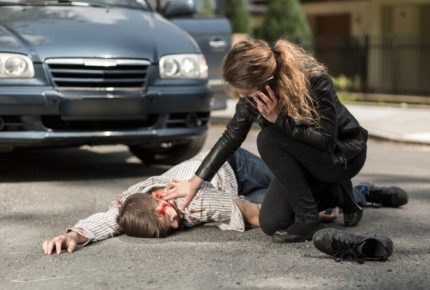

Murder is not the only offence involving the death of another that can get you put in prison for life. Even where you did not intend to kill anyone, your carelessness could nonetheless land you in hot water. If in the event of someone’s death you were grossly negligent in your duties as a medical expert or employer, you could be liable for manslaughter by gross negligence. If you or someone you care about has been charged with this crime, read on to find out more about the offence, defences, and potential sentences.
What is classed as manslaughter by gross negligence?
Manslaughter by gross negligence is a form of ‘involuntary manslaughter’. It is understood as occurring where a person who owes a duty of care to someone breaches that duty causing the death of that person, and is in addition grossly negligent in doing so. If all of these elements are satisfied, they are said to be guilty of manslaughter by gross negligence. There are therefore four elements to the crime according to the Crown Prosecution Service:
- The defendant (the person accused) owed a duty of care to the deceased
- By a negligent act or omission (an omission is where you fail to act) the defendant was in breach of the duty that he or she owed to the deceased;
- The negligent act or omission was a cause of the death; and
- The negligence, which was a cause of the death, amounts to gross negligence and is therefore a crime.
In addition, the prosecution will try to prove that the serious and obvious risk of death must have been reasonably foreseeable. In these cases, ‘serious’ and ‘obvious’ are given their usual meaning in English.
These are the requirements that must be met to be found guilty of manslaughter by gross negligence. If you have been charged with a different type of manslaughter, read here.
What would satisfy each element varies from case to case, but generally:
Duty of care
Certain relationships have a duty of care built into them: doctors and patients, parents and children, etc. But there is no general duty of care to other people. There is a duty depending on the circumstances of the relationship to that person. A company, for example, must ensure the health and safety of its employees on the job. There are no formal list categories though. It is ultimately for the jury to decide whether a duty of care exists, on the proper instructions of the judge.
If you are unsure whether you owe a duty of care to anyone, make sure to contact an experienced criminal defence solicitor.
Breach of duty
Once it is established there is a duty of care, it is to be established that there was a breach of that duty. Whether there was a breach is an objective question, which is asked in the following way: Would a person in the same position/occupancy as the defendant have acted in the same way? If not, there has likely been a breach of the duty of care.
The question of breach is objective, which means it does not ask whether the person thought they breached a duty or intended to breach their duty. The question is whether they in fact did.
Gross negligence
Not only must there a be a breach of the duty of care, but the defendant must have been negligent too. But manslaughter by gross negligence requires something extra, and it is right there in its name: gross negligence. The negligence must be so gross that it justifies being called a crime. Another way to describe it would be ‘extreme’ or ‘serious’ carelessness or recklessness. Gross negligence is established by looking at all the circumstances of the case, not just the breach of the duty of care.
Serious and obvious risk of death
That there is a serious and obvious risk of death means that there needs to be more than a risk of injury. The defendant must have foreseen that the risk of death was present. If a person in the position of the accused could not have foreseen such a risk, the defendant cannot be found guilty by a court of law.
Causation
In order for a person to be found guilty of manslaughter by gross negligence, the death of the alleged victim must have been caused by the breach of the accused’s duty of care. It need not be the only cause of death, however.
Manslaughter by gross negligence examples
- A medical professional whose patient dies due to their gross negligence under their care
- An employer whose employee dies due to their gross negligence in upkeep of working conditions
- A person who provides drugs to another person who then dies from the drug may be liable for manslaughter by gross negligence.
- It has been held that a person is guilty of manslaughter by gross negligence where they ask another to come assist them with burning down an unused building and that person dies.
What is the maximum sentence for manslaughter by gross negligence?
Since 1 November 2018, the maximum sentence for manslaughter by gross negligence has been life imprisonment, triable on indictment only. There is the option of parole after one to 18 years in prison. You can find more detailed information on sentencing here.
What types of evidence are used in manslaughter by gross negligence cases?
As always, the prosecution must prove the offence occurred and the accused was responsible for it beyond a reasonable doubt. Instances of manslaughter by gross negligence are proven in the usual way, by establishing that the previously mentioned elements of the crime exist.
The most difficult aspects to prove are usually (1) gross negligence, which is more than mere negligence, and (2) breach of the duty of care. Here, the sort of evidence that is usually used is oral testimony, hard evidence, and the evidence given my medical experts in the form of oral testimony or written evidence, especially when the case is one of medical manslaughter by gross negligence. Experts would give evidence as to what a doctor in the position of the accused might have done, and talk about the grossness of the accused’s negligence, among other things.
In easy cases, the duty of care exists between a doctor and a patient, for example, or an employer and employee. However, in more difficult cases, this becomes proportionately more difficult to prove.
What are the applicable manslaughter by gross negligence defences?
It would be a defence to the crime of manslaughter by gross negligence to raise sufficient doubt that one of the four elements is not met. In other words, raising the point with sufficient evidence to show that there is no duty of care, that there was no breach of the duty of care, that the alleged breach did not cause death, or that it is not grossly negligent. Lawyers are trying to ‘knock out’ one of the elements to make the crime ‘incomplete’.
In addition, there are general defences that may be available.
General defences
In some circumstances, you may be able to rely on a ‘general defence’, including:
- Duress: a person or a circumstance forced you to commit the offence, leaving you with no other option
- Automatism: this is a rare defence, which needs to be backed up by evidence, stating you were not aware of your actions when committing the offence
- Insanity: due to a mental condition or illness, you did not actually intend to commit the offence. As with automatism, you would need medical evidence to prove you were not of sound mind at the time of committing the offence
- Intoxication: the courts will not accept voluntary intoxication (choosing to consume drugs and alcohol) as an excuse for criminal behaviour. However, you may be able to rely on the defence of intoxication if you were involuntarily drugged at the time of the events or if you were affected by prescription medication and were not aware it would make you act that way
- Mistake: if you were mistaken about certain facts, contexts, people, or the situation, and would not have committed the offence if you had known otherwise, you could rely on this defence.
Exactly how these defences apply to manslaughter by gross negligence is complex and sometimes not all these defences will be available. A criminal defence solicitor will be able to advise you based on the specifics of your case.
What happens if a defence to manslaughter by gross negligence is successful?
A successful defence may lead to you being acquitted or convicted of a lesser charge, depending on the defence you raise. This could mean you escape punishment altogether, or that you get a shorter sentence. Defences to manslaughter by gross negligence are highly fact dependent, so it is always advisable to seek advice from a criminal defence solicitor who has proven experience with these cases.
Where to find help with manslaughter by gross negligence charges
If you or someone that you care about is has been charged with manslaughter by gross negligence, the team at Stuart Miller Solicitors is on standby ready to assist. We have a truly expert team with near countless years’ experience dealing with crimes of this nature. To arrange a friendly no-obligation consultation, please get in touch today.

